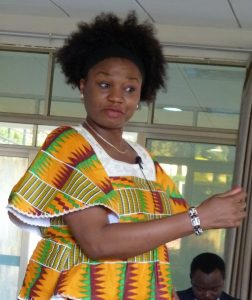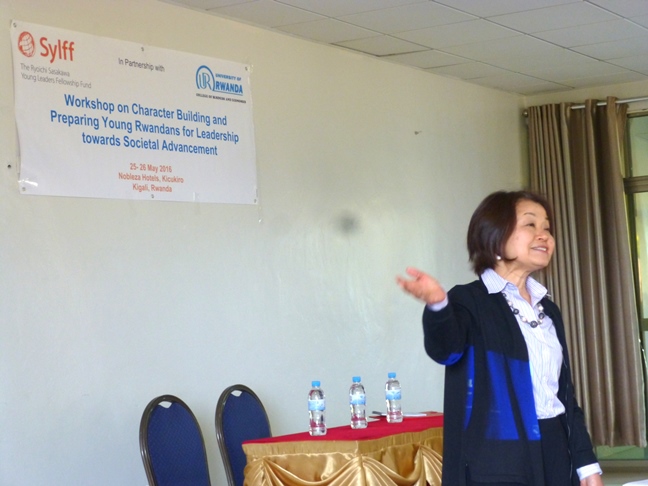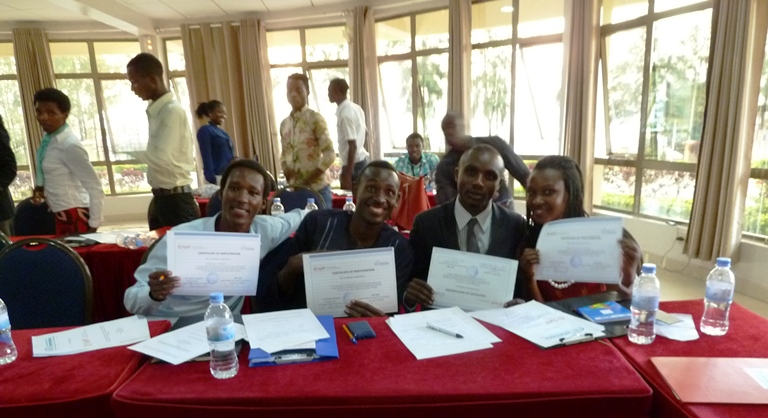Voices from the Sylff Community
Jan 30, 2017
[Report] Leadership and Character Building for Youth in Rwanda
Chika Ezeanya-Esiobu, who received a Sylff fellowship at Howard University in 2010, organized an SLI workshop on youth leadership empowerment in May 2016. Attending the workshop in Kigali, Rwanda, as observers from the Tokyo Foundation were Mari Suzuki, director for leadership development, and two program officers: Keita Sugai and Aya Oyamada.
* * *
Twenty years after the genocide in which as many as 1 million people are thought to have lost their lives, Rwanda today is making great strides in its social and economic development. What is necessary for further development?
The answer, for Sylff fellow Chika Ezeanya, was clear: leadership. Each and every citizen needs to be aware of the obligation to make a positive contribution to society through their actions. To promote such awareness among university students, she organized a workshop on youth leadership empowerment as a Sylff Leadership Initiatives (SLI) project on May 25-26, 2016, at the University of Rwanda’s College of Business and Economics in Kigali, Rwanda.
Ezeanya was one of three speakers at the event, titled “Workshop on Character Building and Preparing Young Rwandans for Leadership towards Societal Advancement.” Over the two-day workshop, discussions were held on the importance of respect for social norms, setting of goals, and the development of self-motivated leadership to effectively manage one’s strengths and weaknesses. Discussions on how individuals can contribute to the resolution of social issues focused on the imaginative power needed to pinpoint and address key problems.
During the Q&A session near the end of the workshop, one female student who had lost her parents during the genocide asked about reconciliation: “I myself am working to forgive. But how can we communicate these experiences to the next generation and carry on with the process of reconciliation?”
In response, Salomon Nshimiyimana, who teaches at the university as executive assistant, said that no clear-cut answers exist. But just as the antagonism between ethnic groups deepened over many years, “Reconciliation, too, is a process that will take time,” he said.
Dealing directly with difficult issues that people tend to avoid is an important aspect of leadership, and individuals who can encourage people to speak their minds and bring about meaningful dialogue are likely to play a key role in demonstrating true leadership and moving society forward.
Julius Tumwesigye, one of the students attending the workshop, said, “It was a great contribution to Rwanda’s future, as it provided us with various leadership skills and instilled in us the importance of self-leadership.” Other students said the workshop had inspired them to spread the message of personal and social responsibility throughout the university. Such reactions from the country’s future leaders were one of the positive results of the workshop.
The organizers are to be congratulated for the success of this very important workshop. The Tokyo Foundation hopes that Dr. Ezeanya, through her work on solving the social problems she encounters in her daily life, will become one of the leaders who will help to build a brighter future for Africa.



Comments
Sylff staff
It was a great workshop for the youth of Rwanda. By nature, they started as intent listener. They became outspoken toward the end of the workshop and raised difficult issues confronting the society. Dr. Ezeanya did a superb job in planning and implementing the workshop.